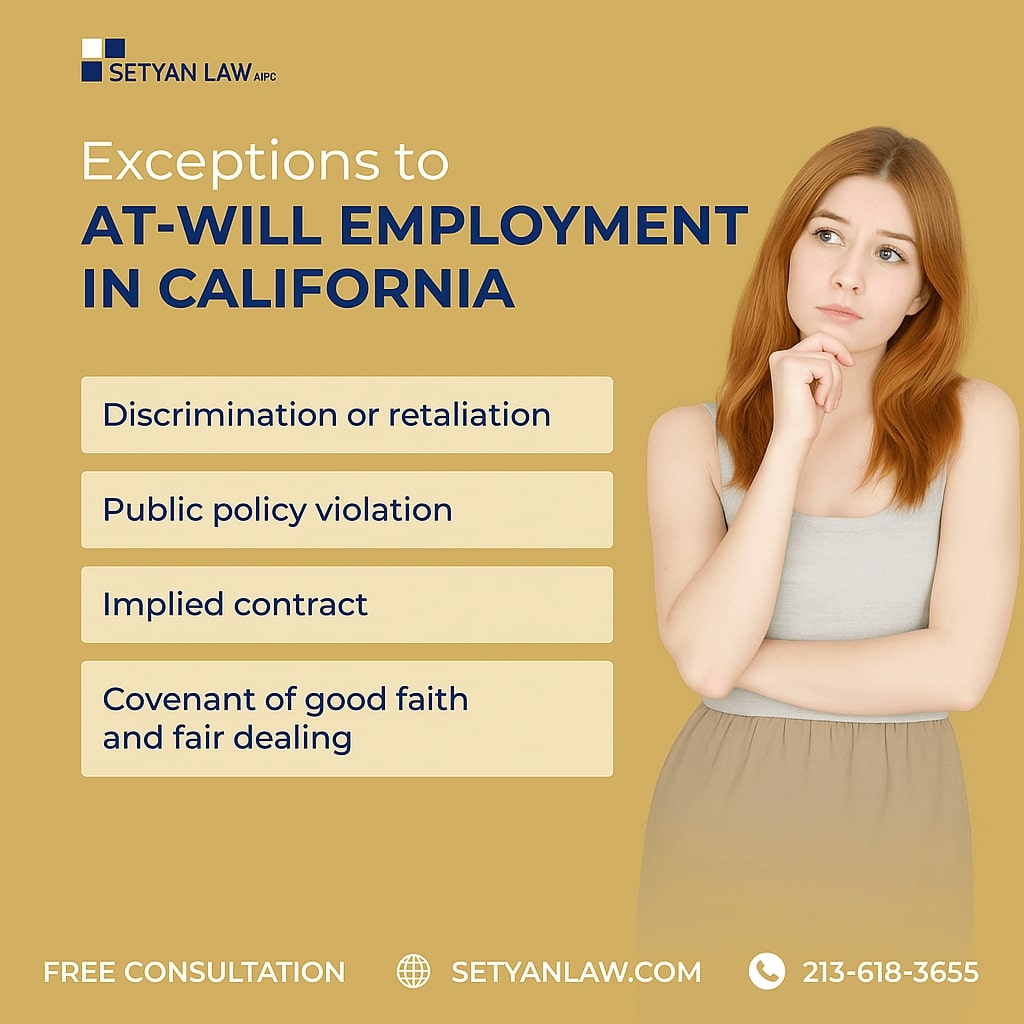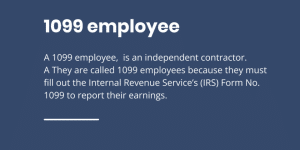Updated April 17, 2025
Understanding “At-Will” Employment in California
In California, the concept of at-will employment is a cornerstone of labor law, allowing both employers and employees to terminate an employment relationship at any time and for almost any reason. This flexibility, however, is not without its limitations. Several exceptions exist to protect employees from wrongful termination, ensuring that they are not dismissed for illegal reasons or in violation of established agreements. This article will delve into the fundamental exceptions to the at-will employment doctrine in California, providing a comprehensive overview of employee rights and employer obligations.
What is At-Will Employment?
At-will employment means that either the employer or the employee can end the employment relationship without prior notice and without providing a reason. This legal framework is designed to offer flexibility to both parties. For example, an employee may leave a job for a better opportunity, while an employer can terminate an employee if their performance is lacking, even if no formal reason is given.
However, this seemingly straightforward arrangement can lead to confusion and potential abuse. Employers are still bound by various laws and regulations that prevent them from terminating employees for discriminatory reasons or in violation of public policy. It is essential for employees to understand their rights within this framework.
Exceptions to At-Will Employment
While at-will employment provides significant leeway, California law recognizes several exceptions that can protect employees from wrongful termination. Below are the primary exceptions that employees should be aware of:
1. Contractual Agreements
Express Contracts
An express contract is a clearly defined agreement between an employer and an employee, specifying the terms of employment, including grounds for termination. If such a contract exists, the at-will employment doctrine may not apply. For instance, if an employee has a written contract that states they can only be terminated for just cause, the employer must adhere to those terms.
Implied Contracts
Even in the absence of a formal written agreement, an implied contract may arise based on the employer’s conduct or established practices. For example, if an employer has a history of providing job security or has communicated assurances of continued employment, this could create an implied contract. If an employee is terminated despite these assurances, they may have grounds for a wrongful termination claim.
2. Public Policy Exception
The public policy exception protects employees who are terminated for reasons that violate fundamental public policy. This includes situations where an employee is fired for:
- Refusing to engage in illegal activities (e.g., reporting unsafe working conditions)
- Exercising a legal right (e.g., taking family leave)
- Reporting violations of law or public policy (whistleblowing)
For example, if an employee is terminated for reporting their employer’s unlawful practices, they may have a valid claim under this exception.
3. Implied Covenant of Good Faith and Fair Dealing
California courts recognize an implied covenant of good faith and fair dealing in employment contracts. This means that employers must act in good faith and deal fairly with their employees. If an employer terminates an employee in bad faith—such as to avoid paying benefits or to retaliate for a legitimate complaint—they may be liable for wrongful termination.
Examples of Bad Faith Termination
- Terminating an employee shortly before they become eligible for a pension or other benefits
- Dismissing an employee to punish them for reporting violations of company policy
4. Fraudulent Misrepresentation
If an employer makes false representations to an employee to induce them to accept a job, and later terminates them based on those misrepresentations, the employee may have grounds for a claim based on fraud. For example, if an employer claims that a job is secure and then terminates the employee shortly after hiring them, the employee may argue that they relied on the employer’s misrepresentation.
Constructive Termination
In addition to wrongful termination claims, employees may also seek recourse for constructive termination. This occurs when an employer creates an intolerable work environment, forcing the employee to resign. While constructive termination is not inherently illegal, if the working conditions are the result of unlawful conduct (e.g., harassment or discrimination), the employee may have a valid claim.
Key Elements of Constructive Termination
To establish constructive termination, an employee must demonstrate that:
- The employer created a hostile or intolerable work environment
- The employee had no reasonable alternative but to resign
- The employer’s actions were unlawful or in violation of established policies
Legal Recourse for Wrongful Termination
If an employee believes they have been wrongfully terminated, they have several avenues for legal recourse. The first step typically involves filing a complaint with the appropriate government agency, such as the California Department of Fair Employment and Housing (DFEH) or the Equal Employment Opportunity Commission (EEOC). These agencies can investigate the claim and, if warranted, provide the employee with the right to pursue a civil lawsuit.
Steps to Take After Termination
- Document Everything: Keep records of any communications, performance reviews, and relevant incidents leading up to the termination.
- Consult an Employment Lawyer: A qualified attorney can help assess the situation and provide guidance on the best course of action.
- File a Complaint: Depending on the circumstances, filing a complaint with the appropriate agency may be necessary.
- Consider Legal Action: If the agency finds merit in the claim, the employee may proceed with a civil lawsuit against the employer.
Conclusion
Understanding the exceptions to at-will employment in California is crucial for employees to protect their rights and seek justice in the face of wrongful termination. By being aware of contractual agreements, public policy exceptions, the implied covenant of good faith, and fraudulent misrepresentation, employees can better navigate the complexities of employment law.
If you believe you have been wrongfully terminated or are facing intolerable working conditions, it is essential to consult with an experienced employment lawyer who can help you understand your rights and guide you through the legal process. Remember, you have the right to work in an environment free from discrimination and retaliation, and there are legal protections in place to uphold those rights.
Consulting a wrongful termination attorney will provide you with the necessary guidance and support to navigate the legal process effectively. Remember, time is of the essence, so seek legal advice promptly to maximize your chances of a successful outcome.
Call Setyan Law at (213)-618-3655 for a consultation.







